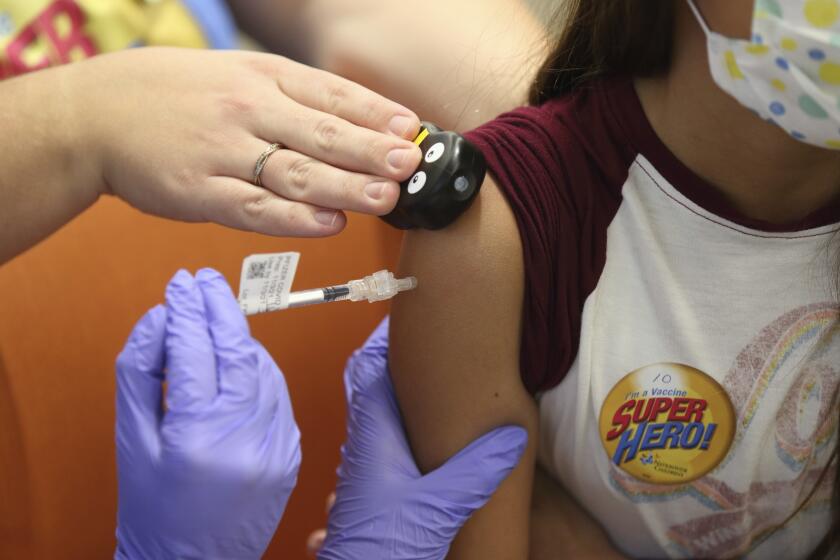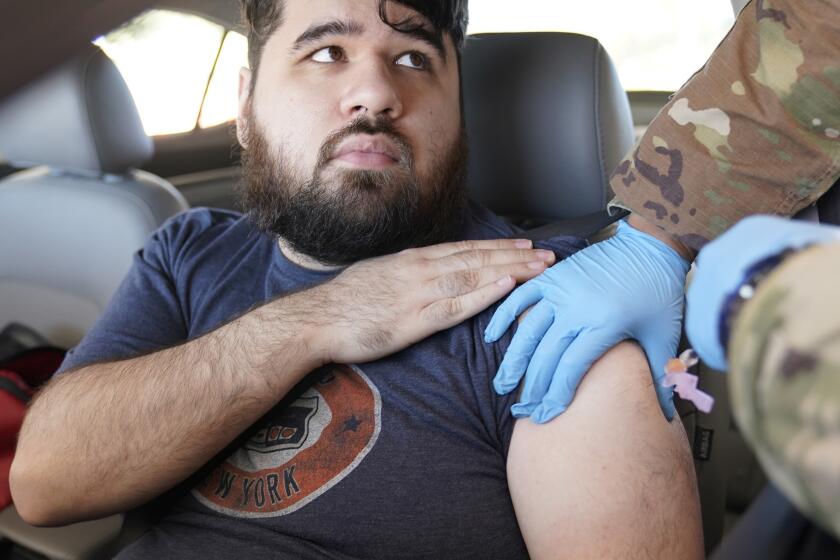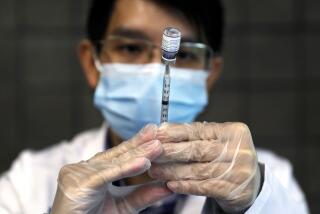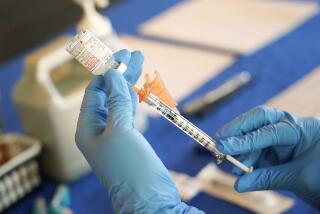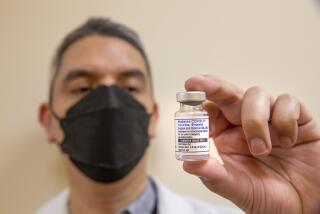CDC urges COVID-19 boosters starting at age 12 to fight Omicron
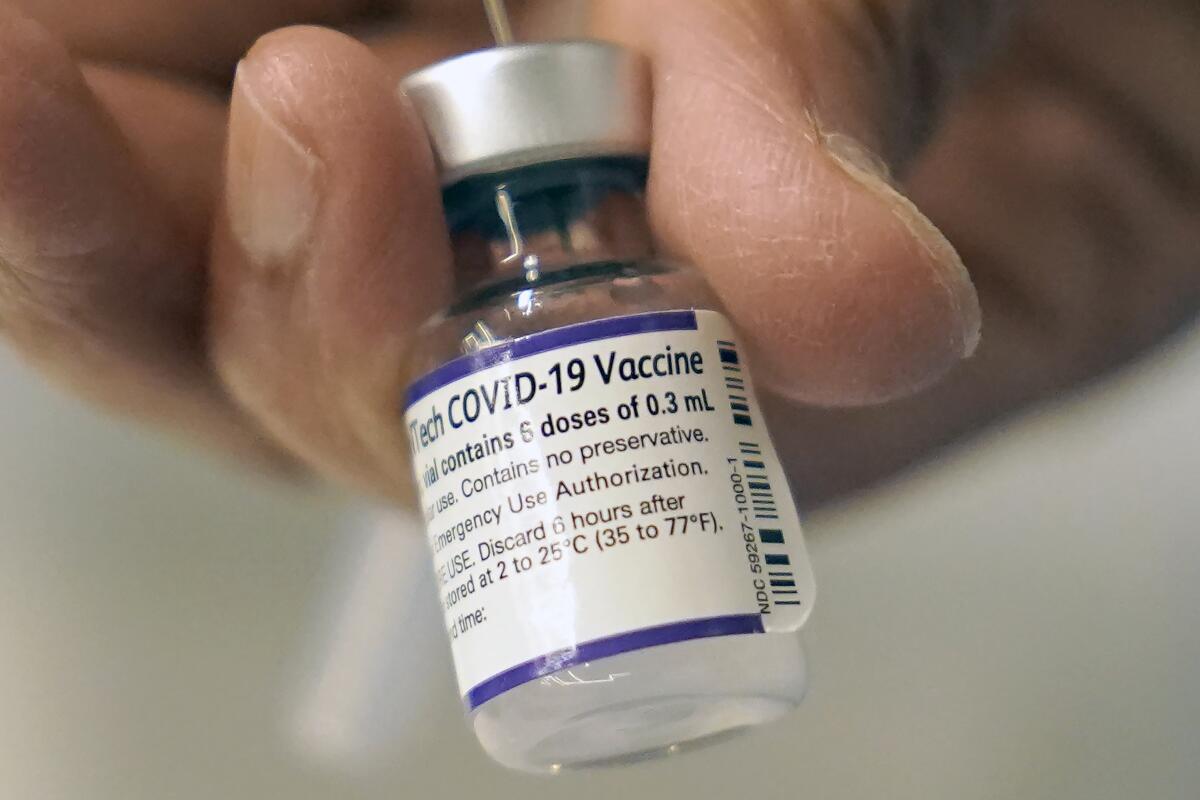
- Share via
The U.S. is urging that everyone 12 and older get a COVID-19 booster shot as soon as they’re eligible to help fight the hugely contagious Omicron variant that’s spreading through the country.
Boosters already were encouraged for American adults, and they’ve been available to 16- and 17-year-olds since last month. But on Wednesday, the Centers for Disease Control and Prevention endorsed an extra Pfizer shot for younger children — those 12 to 15 — and strengthened its recommendation that 16- and 17-year-olds get a third jab too.
“It is critical that we protect our children and teens from COVID-19 infection and the complications of severe disease,” Dr. Rochelle Walensky, the CDC’s director, said in a statement.
“This booster dose will provide optimized protection against COVID-19 and the Omicron variant,” she said. “I encourage all parents to keep their children up to date with CDC’s COVID-19 vaccine recommendations.”
Vaccines still offer strong protection against serious illness caused by any coronavirus variant, including Omicron — which experts say is their most important benefit. But the newest strain appears to be more adept at slipping past a layer of the vaccines’ protection to cause milder infections. Studies show a booster dose at least temporarily revs up virus-fighting antibodies to levels that offer the best chance at avoiding COVID-19.
Earlier Wednesday, the CDC’s independent scientific advisors wrestled with whether a booster should be an option for younger adolescents — who tend to not get as sick from COVID-19 as adults — and, if so, whether it should be more strongly recommended. By a vote of 13 to 1, the panel came down in favor of encouraging the younger group to get the third dose.
The FDA also said everyone 12 and older eligible for a booster can get one as early as five months after their last dose rather than six months.
Giving teens a booster for a temporary jump in protection is like playing a game of whack-a-mole, cautioned Dr. Sarah Long of Drexel University, a member of the CDC’s Advisory Committee on Immunization Practices. But she said the extra shot was worth it to help push back the Omicron variant and shield kids from the missed school and other problems that accompany even a very mild case of COVID-19.
More important, if a child with a mild infection spreads it to a more vulnerable parent or grandparent who then dies, the impact “is absolutely crushing,” said panel member Dr. Camille Kotton, an infectious-disease specialist at Massachusetts General Hospital.
“Let’s whack this one down,” agreed Dr. Jamie Loehr of Cayuga Family Medicine in Ithaca, N.Y.
The vaccine made by Pfizer and its partner BioNTech is the only option for American children of any age. The CDC says about 13.5 million children ages 12 to 17 — slightly more than half of that age group — have received two doses.
Wednesday’s decision means about 5 million of the younger adolescents who had their last shot in the spring or early summer are eligible for a booster right away. New U.S. guidelines say anyone who received two Pfizer doses and is eligible for a booster can get it five months after their second shot, rather than the six months previously recommended.
With immunity waning and the Omicron variant looming, many scientists are saying the definition of ‘fully vaccinated’ should include a booster shot.
One committee member, Dr. Helen Keipp Talbot of Vanderbilt University, worried that a strong recommendation for adolescent boosters would distract from the work of getting shots into the arms of kids who have not been vaccinated at all.
The advisors were presented with U.S. data making clear that COVID-19 cases and hospitalizations are between seven and 11 times higher in unvaccinated adolescents than in vaccinated ones.
Although children tend to suffer less serious illness from COVID-19 than adults, child hospitalizations are rising during the Omicron wave, mostly among the unvaccinated.
During the public comment part of Wednesday’s meeting, Dr. Julie Boom of Texas Children’s Hospital said a booster recommendation for younger adolescents “cannot come soon enough.”
The Food and Drug Administration authorized an extra Pfizer shot for kids ages 12 to 15 on Monday. The FDA decided a booster dose was as safe for the younger group as it was for the the older ones based largely on data from 6,300 12- to 15-year-olds in Israel who got a Pfizer booster five months after their second dose.
The chief safety question for adolescents is a rare side effect called myocarditis, a type of heart inflammation seen mostly in younger men and teen boys after immunization with either the Pfizer or Moderna vaccines. The vast majority of cases are mild — far milder than the heart inflammation COVID-19 can cause — and they seem to peak in older teens, those 16 and 17.
FDA vaccine chief Dr. Peter Marks said the side effect occurs in about 1 in 10,000 men and boys ages 16 to 30 after their second shot. But he said a third dose appears less risky, by about a third, probably because more time has passed before the booster than between the first two shots.
